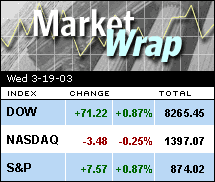NEW YORK (CNN/Money) -
"Hurry up and wait," is what they say in the military. With the second Persian Gulf war just under way Thursday morning, it was a phrase that Wall Streeters could relate to.
The war began not with the example of "shock and awe" that Pentagon officials had suggested, but with a targeted U.S. cruise missile strike at dawn in Baghdad aimed at Iraq's leadership. It appears that the United States, acting on intelligence, may have shifted its initial war plans to take advantage of an opportunity to, in President Bush's words, "take out" Saddam Hussein. Saddam Hussein appears to have survived the attack.
Shock and awe, if it is to come, will come later, leaving investors struggling to figure out what to do next.
"There is nothing in the market that tells me what's going to happen," said Phil Ruffat, director of the futures division at Mizuho Securities USA. "This is going to be interesting."
Stock index futures were pointed lower, but only slightly, indicating a soft start for the major indexes. Bonds were up, the dollar was somewhat lower, oil was flat and stocks in Europe were playing near the flat line.
"Markets are just washing around," said David Smith, managing director of Cantor Fitzgerald's London office. "I can sympathize with people who don't quite know what to do. The war hasn't really started."
Adding to the confusion, pointed out HSBC currency strategist Marc Chandler, the action in different markets was inconsistent. Gold, a traditional safe-haven investment, declined -- a sign that investors believe the war will go quickly. But the dollar, too, lost value -- a sign of worry that the war may be more drawn out than it is hoped for.

| |
|
For details of Wednesday's trading, click above
|
|
The market reaction thus far stands in stark contrast to what happened on the first day of Operation Desert Storm. Following early morning air-strikes against Iraq on Jan. 17, 1991, the Dow Jones industrial average jumped 4.6 percent and oil fell by $10.90 to $21.30.
But also unlike Desert Storm, when market participants were far more fearful that war with Iraq would be prolonged, traders have avidly bought shares in recent sessions. In the week ended Wednesday, the Dow has risen 9.4 percent. This move has given rise to concern that the market may be priced for a perfect war, or at the least in need of some sort of breather.
Meanwhile, Kuwait has been the center of attention in the early morning hours as Iraq launched four missiles, two of which were shot down by U.S. Patriot missiles, at the country. There were no injuries reported, and no signs that the missiles carried either chemical or biological weapons. U.S. forces are massed in Kuwait for invasion
Click here for CNN.com's coverage of the war
On the economic front, the Labor Department said the number of Americans filing new claims for unemployment benefits fell to 421,000 in the week ended March 15 from a revised 425,000 the prior week. Economists, on average, expected 420,000 new claims, according to a Reuters poll.
With its 0.9 percent gain Wednesday, the Dow carries a six-session winning streak, the longest since August 2000. The Nasdaq composite index comes off a losing day, but only by a quarter percentage point, and that was due mainly to tech weakness spurred by the murky sales forecast issued by Oracle late Tuesday (see chart for details).
Asian stocks ended higher Thursday. Tokyo's Nikkei index staged a big rally, but pulled back on word of the U.S. move to finish up 1.8 percent. Hong Kong's Hang Seng also came off its best levels of the day to finish up 0.4 percent.
Seoul's Kospi put on the biggest gains of the day, jumping 4.9 percent. For South Korean investors, resolution with Iraq has come to be seen as a proxy for the defusing of the North Korean crisis. But South Korean authorities don't appear to share that view: South Korea's military lifted its alert status to the highest level in seven years on concern that North Korea may use international distraction over Iraq to conduct more missile tests and accelerate its nuclear program.
European markets spent the day flipping through the positive and negative columns. Frankfurt's DAX was up 0.5 percent, Paris' CAC was up 0.3 percent and the FTSE was down fractionally in London.
The benchmark 10-year Treasury was slightly higher in early trading, coming off recent lows. The yield dipped to 3.96 percent from 3.98 percent late Wednesday. The dollar was lower against the yen and euro.
Brent oil futures slipped 15 cents to $26.60 a barrel in London, where gold was slightly lower.
After trading begins, the February Index of Leading Economic Indicators is scheduled to be released by the Conference Board. That index is expected to show a 0.4 percent drop, compared with a 0.1 percent dip in January.
At about noon ET, the Federal Reserve Bank of Philadelphia issues its regional index of economic activity. It's seen falling to minus 1 for March from plus 2.3 in February.

|

